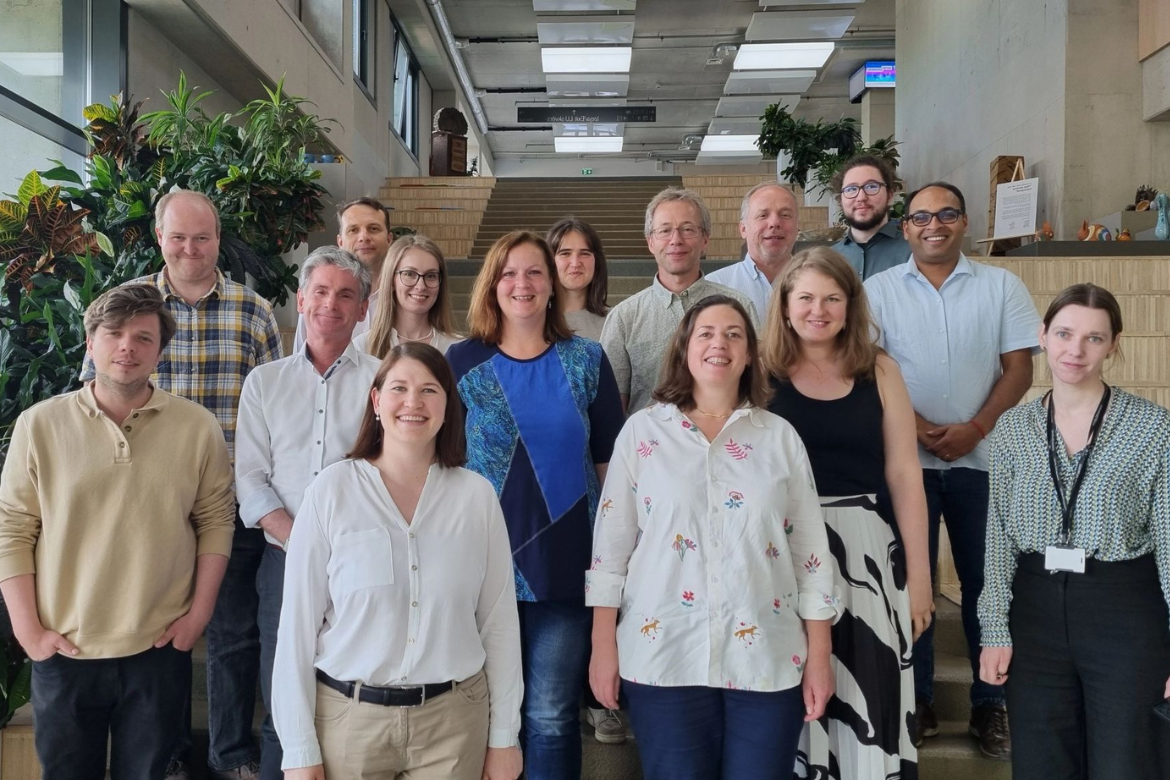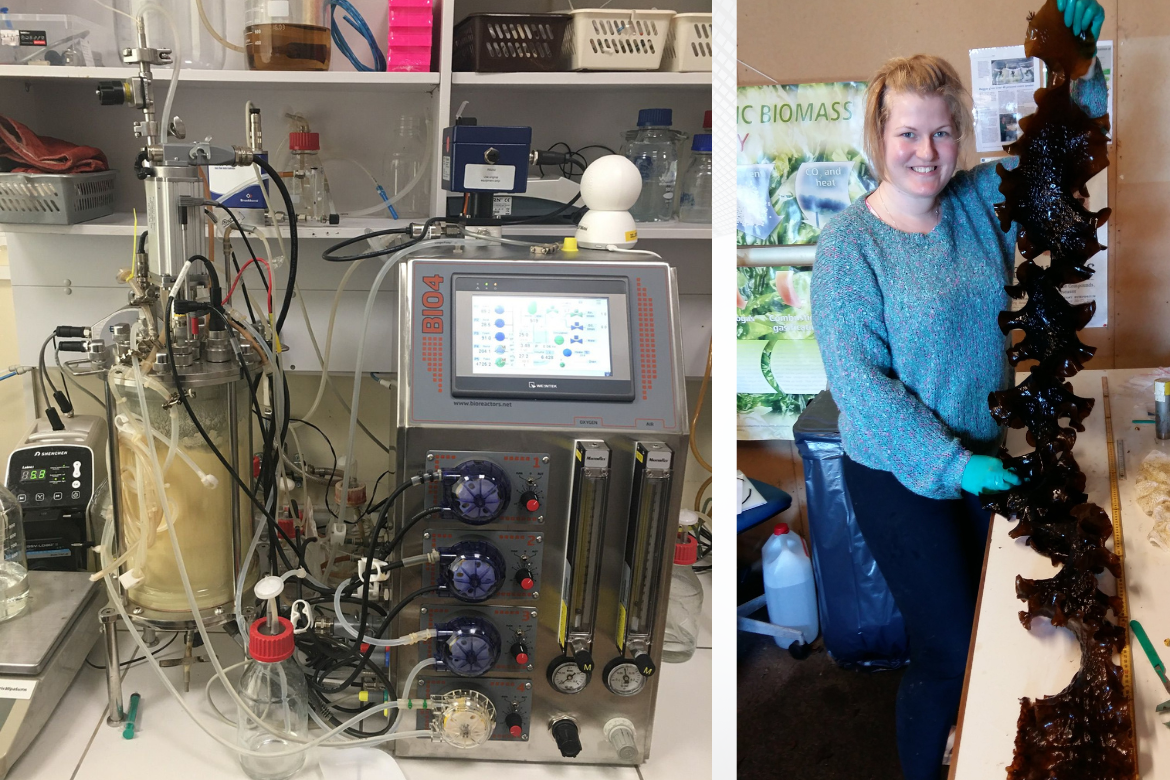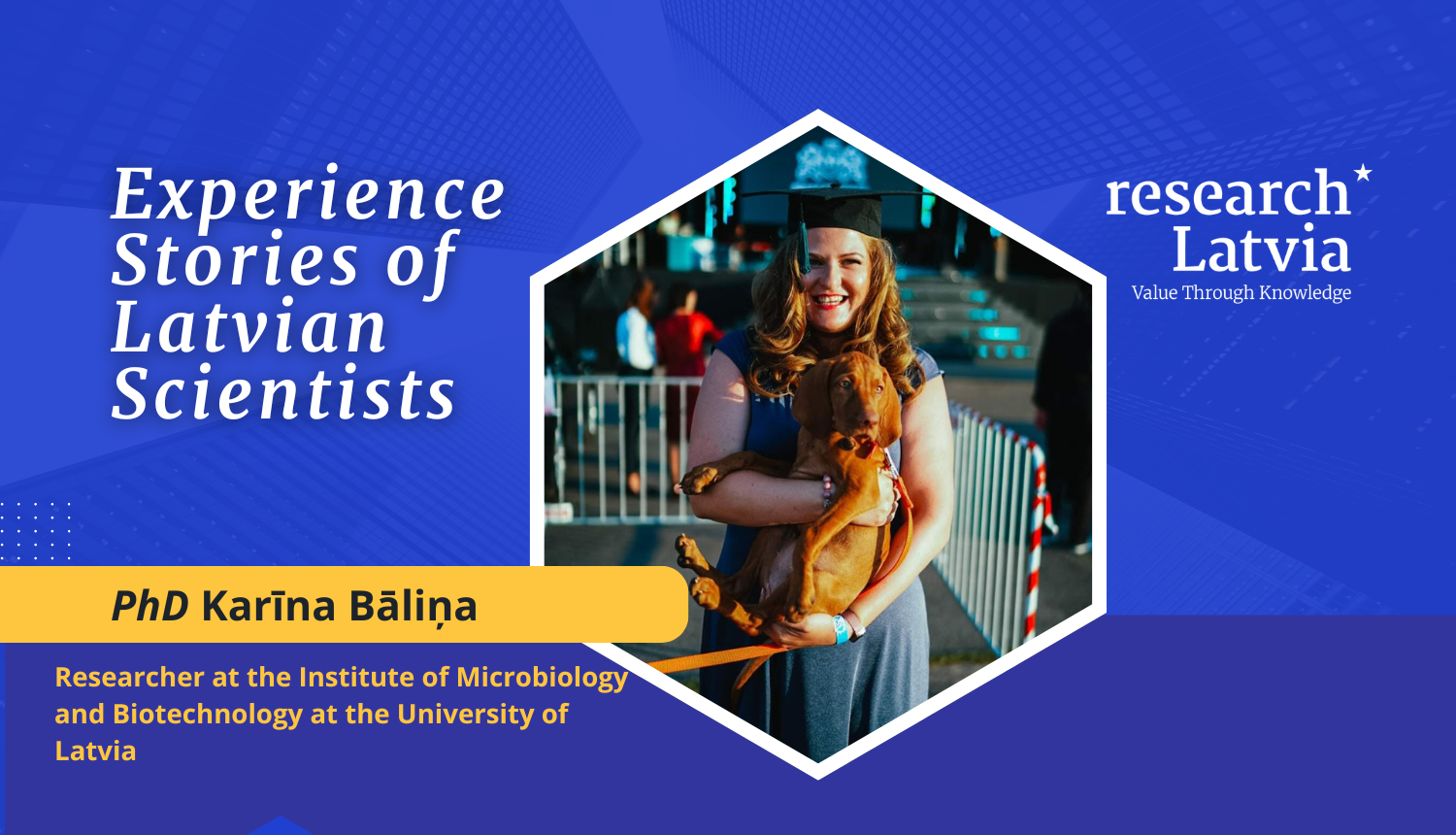Karīna Bāliņa, PhD, Doctor of Environmental Engineering, is an outstanding researcher whose work focuses on environmental impact assessment using the life cycle modeling method. Karīna is particularly interested in marine seaweed and their sustainable use both in Latvia and Europe. As a researcher at the Institute of Microbiology and Biotechnology at the University of Latvia (UL) Faculty of Medicine and Life Sciences, she actively participates in innovative research projects at both locally and internationally. In an interview with the science communication portal “researchLatvia” Karīna shares not only her achievements, but also inspires young researchers and students to explore, develop, and engage in science.
The Baltic seaweed is a significant and promising research subject that can offer major benefits for the development of coastal bioeconomy, contribute to environmental protection, and facilitate the management of local bioresources and scientific discoveries. Karīna graduated from the UL Faculty of Biology but defended her PhD at the Rīga Technical University (RTU) in 2020, studying the seaweed biorefinery of the Baltic Sea. As part of the research, she explored the seaweed resources in Latvia and their potential applications, describing not only the biorefinery concept but also how seaweed biomass could be cultivated in the laboratory. “Now we should move this concept forward by focusing on specific species and more precise value chains. Previously, the theoretical concept has been developed, but to test products, it needs to be advanced at the laboratory and production levels,” Karīna explains her vision, emphasizing that the next step would be developing of the concept of red algae valorization based on sustainability principles.
Seaweed and the Circular Economy
Currently, in Karīna’s professional everyday life and active scientific work, algae represent an area of expertise - combining algae and life cycle assessments in innovative biorefinery processes during the technology design stage. The scientist explains that “biorefinery is a method for processing biomass to obtain fuel, energy, and value-added products such as chemicals and materials. It is an essential part of the bioeconomy, integrating various biomass conversion processes to produce value-added products and bioenergy into a single system”.
In the international community of researchers, PhD K. Bāliņa actively carries the name of Latvia and promotes cooperation in the field of science and technology, participating in several COST Actions (European Cooperation in Science & Technology) that unite scientists from all over the world. Currently, along with more than 300 other researchers, she is particularly involved in the COST Action “SEAWHEAT – Ulva: Tomorrow’s Wheat of the Sea, a Model for an Innovative Mariculture”, where she serves as the Scientific communication committee coordinator in the core group. In these international initiatives, she actively promotes the work of Latvian scientists and participates in large-scale events, while also being invited to collaborate in joint research projects.
“I constantly encourage other scientists to join COST actions, as it is an opportunity to be among like-minded people with whom you can exchange knowledge, as well as learn a lot of new things. In my case, it’s an opportunity to talk about seaweed, sustainability and science. It’s inspiring!” encourages Karīna, who recently started working in another COST action as a representative of Latvia’s management committee.
While work in COST actions is voluntary, they provide funding for mobility, international training, workshops, and other educational activities. At the same time, thematic conferences are held, and work group activities are ongoing. “Recently, along with 17 colleagues, we published a review article on the green seaweed – Ulva. It started as a mini-review but expanded into a comprehensive and knowledge-intensive maxi-review. It’s very inspiring,” shares K. Bāliņa.

Green Technology for a Sustainable Future
K. Bāliņa has been and continues to be involved in several important research projects focused on developing sustainable biotechnologies. For example, as a researcher at the UL, she participated in the implementation of the ERDF project focused on sustainable lipid valorization using waste oils. The goal of this project was to develop a bioreactor for biosurfactant production via yeast cultivation and using waste cooking oil oils as a substrate. As part of the project, both laboratory experiments and modeling of yeast metabolism were carried out to produce as many biosurfactants – sophorolipids as possible. Sophorolipids can be biological substitute for conventional surfactant such as sodium laureth sulphate. They can be used in producing detergents or in industry, including food. Although the product developed in the project is not in the market yet, such products become more accessible to consumers. More biosurfactants, biological surfactants, are on sale.
Efforts were also made toward commercialization by partnering with JSC "Biotechnical Center" (currently - bioreactors.net), which develops bioreactors and corresponding software - sensors, etc. In this project Karīna carried out the life cycle assessment of this production process to identify, from the early stages of technology development, which production stages would have the highest environmental impact. “From the design stage of the bioreactor, we looked at the environmental hotspots to identify how to optimize the technology to reduce the environmental impact. By recycling waste products such as waste cooking oil, we can reduce the environmental impact, as we can avoid using raw rapeseed oil for this purpose. Instead, the used cooking oil that can no longer be used for food can be used. Currently, waste cooking oil is used to produce biodiesel and biogas," explains the researcher.
Currently, together with partners from Germany and Romania, K. Bāliņa is involved in the M-ERA.NET project and developing bioreactors. These bioreactors use hybrid living membranes made from recycled PET material, suitable for growing microorganisms. As microorganisms, microalgae and bacteria consortium are used, both of which live together and grow symbiotically, i.e., in a mutually beneficial interaction. Bacteria use oxygen for respiration and release CO2, while algae perform the opposite process. Thus, scientists are developing a new technology that is entirely different from conventional bioreactors. This project is unique because it uses consortia of microorganisms that form biomass in the form of biofilms. As part of the project, an environmental impact assessment is also carried out. The aim is to transfer the concept of how farms and agriculture operate to the microbiological level - using gases like CO2 and methane produced in agriculture to feed microorganisms. The goal of the project is to produce 1kg of biomass per day. Additionally, Karīna works as a visiting researcher at the RTU Liepāja Academy, where she plans to create innovative composite materials by developing components from algae and investigating the environmental impact of different stages of algae cultivation.
Latvia's Role in Algae Research
Karīna acknowledges that due to Latvia’s seasonal peculiarities and other factors, it is unlikely that our country will become a superpower in seaweed cultivation. However, Latvian researchers can contribute significantly to the knowledge base. “It’s not always necessary to be a leader, but it’s important to be part of the community and get involved. Overall, the algae research community in Latvia is currently very fragmented,” comments Karīna. “I don’t believe that Latvia could become a leader in seaweed cultivation, but it can turn into a crucial part an important player in the production and processing of seaweed. In Latvia, the seaweed biomass is small in comparison to other regions, so the existing resources must be used wisely and sustainably. Political support is also essential, so that not only fish aquaculture and fish by-products but also algae become part of Latvia’s blue bioeconomy.”

At present, Estonian, Finnish, and Swedish researchers from the Baltic Sea region are working extensively in this field of research. The Baltic Sea has lower salinity and harsher conditions, so algae do not develop as extensively as, for example, in the western parts of the Baltic Sea, where the salinity is higher. “I do see potential in preparing algae cultivation materials, which is done similarly to laboratory conditions, when seeding is carried out in an incubator on ropes. Currently, they are made of plastic, but there are growing concerns that this plastic breaks down in the ocean, creating microplastic pollution. We have submitted a project proposal to experiment with cultivation on biodegradable materials, such as hemp ropes and wooden logs. The Finnish researchers are already doing this,” explains K. Bāliņa.
From Theory to Discoveries: Advice for Young Researchers and Students
“In Latvia, researchers are very strong, and science has good indicators in various evaluations. In my opinion, Latvia is a very good environment for conducting research and achieving results, despite the many challenges,” emphasizes researcher K. Bāliņa.
“Science needs young and enthusiastic people who want to change the world, not only on a micro-level but also on a larger scale. We must understand that each of us is like a cell in a larger organism, and we all need to function together, complementing one another. If a Latvian becomes a Nobel Prize winner, I believe it will be Agnese Stunda-Zujeva, head of “SpirulinaNord”, with her team.”
“I think that science should be incredibly open, and researchers should share their work and communicate about it, if sensitive information or trade secrets are not involved. My head is overloaded with ideas, but I cannot realize everything on my own. That is why I am not afraid to share my ideas and talk about them. For example, if a researcher called me and asked me to talk about algae, I would tell them all I know. I would just be happy if we could achieve something together in the field of seaweed research. It is a contribution to collective research – it is our shared knowledge base, which is an unbelievably valuable resource.”
“There is so much to do, to study in science, and so many directions to pursue. I advise new students, who are about to start their studies, not to be afraid of the first two study years where all the "dry theory” will be. After that, no matter which direction in science you choose and study, it becomes applicable knowledge in other fields. Then the most interesting research and discoveries emerge. I find it fascinating to be a biologist in the environmental field because I understand how environmental processes work from a biological perspective, offering a unique viewpoint and contribution.”
“The main thing as a student is not to be afraid and to move forward confidently. I recommend getting involved in student councils and various organizations, attending summer schools, and building contacts on an international level. Fellow students will later become colleagues. And it is so enjoyable to meet different people at conferences, whom you have known for years, and then collaborate on joint projects, even internationally.”
Scientist - a Way of Life Permeated by a Data-driven Approach
Karīna’s path to science began in childhood when she was always curious from an early age, and spending a lot of time outdoors, asking the question “Why?”. She was fascinated and inspired by nature and its processes. “I was lucky to have someone who answered all my questions and encouraged, rather than stifled my curiosity. This followed me through school and during the study process. I have never studied just for the sake of studying. I was driven by a desire to know something,” shares Karīna.
“You might not work in the field of research, but you will still be a scientist - it’s a lifestyle,” laughs Karīna. “You just know too much and want to learn even more. I can share my experience when I worked in a local government institution for a while, but I never stopped researching. For example, as an environmental engineer, I had to solve a problem. What did I do first? I opened the SCOPUS database and read the publications.”
“I think it is essential for a scientist not to lose his or her curiosity. It is a driving force,” emphasizes the young researcher. Describing a scientist’s profile, Karīna outlines the set of traits: “A scientist must have curiosity and logical thinking. In art, there is curiosity, and one can explore, but in science, the goal is to make knowledge accessible to others, to society, to explore mechanisms, apply logical reasoning, describe and create theories, and turn ideas into something tangible. To make it commercial, improving people’s well-being and making everyday life more comfortable.”
Effective Science Communication: a Bridge Between Research and Society
Science communication is crucial as it creates a bridge between complex discoveries, innovations, and society, ensuring that research knowledge is accessible and understandable to a broader audience. Moreover, effective science communication can inspire the next generation of scientists and innovators and help address global challenges by collaborating with various societal groups.
“In my opinion, children and young people are the key to science communication. Research should be introduced from an early age. For example, during the annual European Researchers' Night events, science becomes much more accessible to the public and remains open and available,” says K. Bāliņa.
In conclusion, Karīna Bāliņa emphasizes that science is not just about discoveries and innovations but also about the overall well-being of society. She encourages young researchers not to shy away from challenges and to engage in scientific activities with passion because bold ideas and persistent efforts can change the world. “Science requires patience and endurance, but it also provides immense satisfaction,” says Karīna, encouraging everyone to keep searching for answers to complex questions and to build a sustainable future.
Photos: From K. Bāliņa's personal archive.
---
About the Series of Articles “Experience Stories of Latvian Scientists”
This article series, created by the communication platform of the Ministry of Education and Science “researchLatvia,” provides insights into the work of Latvian researchers, promoting a deeper understanding of the role of science in society and fostering dialogue between scientists and the broader community.
These stories invite both current and future researchers and the society to explore the achievements of Latvian science and draw inspiration and motivation from the experiences of individuals who have dedicated their careers to scientific endeavors. The interviews are conducted as part of Project No. 1.1.1.1/1/24/I/001 “More Efficient and Smarter Implementation and Management of Latvian Science Policy.”
